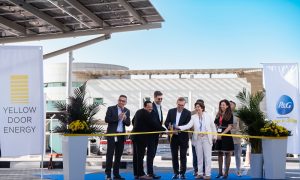JLL whitepaper outlines ways to decarbonise Egypt’s built environment
Egypt will be hosting the 27th Conference of the Parties of the UNFCCC (COP 27) in Sharm El Sheikh between 6-18 November

JLL has outlined simple, rapid changes that can be made in Egypt, so that it can start its the journey towards Net Zero buildings and combat climate change. In a white paper titled ‘Egypt’s Road to Decarbonisation’, the firm looked at the decarbonisation of the built environment and examined ways in which Egypt can win its climate battle.
The report includes a real estate perspective on climate change and the critical role of transparency for decarbonisation; the power of Public-Private Partnerships (PPPs) in tackling climate change; and the importance of closing the funding gap with climate financing and green bonds.
“It is important for Egypt, alongside other nations, to review the plans and actions of the most climate-progressive cities we identified in our recent Global Real Estate Transparency Index, and follow their path in implementing and mandating suitable, climate-friendly real estate regulations, while aligning with international property measurement standards,” said Ayman Sami, Country Head Egypt at JLL.
In August 2022, South Korea Hydro and Nuclear Power won a $2.2bn contract from Russia’s Rosatom to build a nuclear plant in Egypt.

“This could eventually lead to the country committing to a Net Zero goal and the development of a plan to conserve energy and reduce carbon emissions across new and existing stock, including establishing a national retrofitting program.”
Egypt will be hosting the 27th Conference of the Parties of the UNFCCC (COP 27) in Sharm El Sheikh between 6-18 November. The country has emphasised the coming global climate summit will be specifically important, as it will be the year of ‘implementation’ and ‘unlocking climate finance’. COP 27 will also be an opportunity for Egypt to represent the entire African continent and voice all its financial and technological needs to the world.
Sami added, “More governments are becoming aware of the drastic effects of buildings’ carbon emissions on the climate and are starting to mandate energy efficiency and emissions standards for buildings, as well as adopting green building certificates. For Egypt, it’s an opportunity to encourage investors, landlords and occupiers to develop a greener mentality and take their own initiatives to act quickly, without waiting for regulatory measures to kick-in – given the urgency of the climate emergency.”
In early September 2022, Egypt’s Archplan Developments said the region’s first urban forest project reached the 60% completion mark.

Research suggests that now, especially as the host of COP 27, Egypt can drive simple, rapid and effective actions in the real estate sector, such as (retrofitting) LED lighting and installing photo voltaic solar panels – which drastically reduce emissions from electricity, he pointed out.
Over the years, Egypt has made great progress to strengthen its position as an advocate for green financing, most notably with its first sovereign green bond in the Middle East and North Africa (worth US $750mn) issued in September 2020 to finance its climate action plan and achieve its sustainability goals and ambitions.
However, proceeds from the debt sale will be used to finance or re-finance green projects in the transportation sector (46% of proceeds have been allocated for the Cairo monorail), as well as clean water and wastewater management (54% has been dedicated to this sector), with no funding plans relating to buildings.
In early October 2022, Bloom Holding expanded its educational portfolio into Egypt via a joint venture agreement.

Egypt has stated that it requires $250mn to install energy efficient cooling in buildings, and an additional $345mn to incorporate energy efficiency and renewable energy measures in hotels and resorts. The government has also stressed that without the complete support from developed countries, it will not be able to allocate the right financial, technological, and human resources to fulfill the emission reduction pledges of the Paris Agreement.
According to the Climate Action Tracker (CAT), Egypt will only be able to meet its Paris Agreement temperature goals by 2030 if it reduces greenhouse gas (GHG) emissions by at least 25% from current levels. Egypt’s recently updated Nationally Determined Contribution (NDC) to achieve the Paris Agreement temperature goal remains conditional on receiving funding to the tune of $246bn for its mitigation ($196bn) and adaptation ($50bn) plans.
In addition to Egypt’s enhanced goals and ambitions to address climate change, the whitepaper also highlighted the need for enhancement to achieve its Paris Agreement pledges. The country could further strengthen the enforcement of its existing laws, establish a long-term Net Zero carbon goal and join other nations in mitigating climate change, while keeping in mind the built environment’s role in the mitigation process as it is a major contributor to global carbon emissions.
Late in October 2022, Orascom Construction said it added $670mn to its backlog in Q3 2022.























